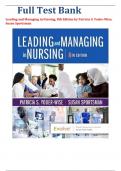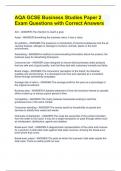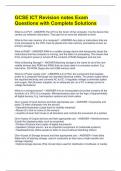Full Test Bank
Leading and Managing in Nursing, 8th Edition by Patricia S. Yoder-Wise,
Susan Sportsman
,Chapter 01: Leading, Managing, and Following
Yoder-Wise: Leading and Managing in Nursing, 8th Edition
MULTIPLE CHOICE
1. A RN manager of a 20-bed medical unit finds that 80% of the clients are older adults. She is
asked to assess and adapt the unit to better meet the unique needs of the older adult client.
Using complexity principles, what would be the best approach to take in making this change?
a. Leverage the hierarchical management position to get unit staff involved in assessment and
planning.
b. Engage involved staff at all levels in the decision-making process.
c. Focus the assessment on the unit, and omit the hospital and community environment.
d. Hire a geriatric specialist to oversee and control the project.
CORRECT ANS: B
Feedback: Complexity theory suggests that systems interact and adapt and that decision
making occurs throughout the systems, as opposed to being held in a hierarchy. In complexity
theory, every voice counts, and therefore, all levels of staff would be involved in decision
making.
REF: Page 8 TOP: AONE competency: Communication and Relationship-Building
2. A unit manager of a 25-bed medical/surgical area receives a phone call from a RN who has
called in sick five times in the past month. He tells the manager that he very much wants to come
to work when scheduled but must often care for his wife, who is undergoing treatment
for breast cancer. According to Maslow’s need hierarchy theory, what would be the best
approach to satisfying
the needs of this RN, other staff, and clients?
a. Line up agency RNs who can be called in to work on short notice.
b. Place the RN on unpaid leave for the remainder of his wife’s treatment.
c. Sympathize with the RN’s dilemma and let the charge RN know that this RN may be
calling in frequently in the future.
d. Work with the RN, staffing office, and other RNs to arrange his scheduled days off
around his wife’s treatments.
CORRECT ANS: D
Feedback: Placing the RN on unpaid leave may threaten the RN’s capacity to meet
physiologic needs and demotivate the RN. Unsatisfactory coverage of shifts on short notice
could affect client care and threaten the needs of staff to feel competent. Arranging the
schedule around the wife’s needs meets the needs of the staff and of clients while satisfying
the RN’s need for affiliation.
REF: Page 10 TOP: AONE competency: Communication and Relationship-Building
,3. A grievance brought by a staff RN against the unit manager requires mediation. At the first
mediation session, the staff RN repeatedly calls the unit manager’s actions unfair, and the unit
manager continues to reiterate the reasons for her actions. What would be the best course of
action at this time?
a. Send the two disputants away to reach their own resolution.
b. Involve another staff RN in the discussion so as to clarify issues.
c. Ask each party to examine her own motives and issues in the conflict.
d. Continue to listen as the parties repeat their thoughts and feelings about the conflict.
CORRECT ANS: C
Feedback: Ury, Brett, and Goldberg outline steps to restoring unity, the first of which is to
address the interests and involvement of participants in the conflict by examining the real
issues of all parties.
REF: Page 16 TOP: AONE competency: Communication and Relationship-Building
4. At a second negotiation session, the unit manager and staff RN are unable to reach a resolution. It
would now be best to:
a. Arrange another meeting in a week’s time so as to allow a cooling-off period.
b. Turn the dispute over to the director of nursing.
c. Insist that participants continue to talk until a resolution has been reached.
d. Back the unit manager’s actions and end the dispute.
CORRECT ANS: B
Feedback: According to the principles outlined by Ury, Brett, and Goldberg, a “cooling-
off” period is recommended if resolution fails.
REF: Page 16 TOP: AONE competency: Communication and Relationship-Building
5. The manager of a surgical area has a vision for the future that requires the addition of RN
assistants or unlicensed persons to feed, bathe, and walk clients. The RNs on the staff have
always practiced in a primary nursing–delivery system and are very resistant to this idea. The
best initial strategy in this situation would include:
a. Exploring the values and feelings of the RN group in relationship to this change.
b. Leaving the RNs alone for a time so they can think about the change before it is
implemented.
c. Dropping the idea and trying for the change in a year or so when some of the present RNs
have retired.
d. Hiring the assistants and allowing the RNs to see what good additions they are.
, CORRECT ANS: A
Feedback: Influencing others requires emotional intelligence in domains such as empathy,
handling relationships, deepening self-awareness in self and others, motivating others, and
managing emotions. Motivating others recognizes that values are powerful forces that
influence acceptance of change. Leaving the RNs alone for a period of time before
implementation does not provide opportunity to explore different perspectives and values.
Avoiding discussion until the team changes may not promote adoption of the change until
there is opportunity to explore perspectives and values related to the change. Hiring of the
assistants demonstrates lack of empathy for the perspectives of the RN staff.
REF: Page 7 | Page 15
TOP: AONE competency: Knowledge of the Health Care Environment
6. As the RN charge RN on the night shift in a small long-term care facility, you’ve found that
there is little turnover among your LPN and nursing assistant (NA) staff members, but they are
not very motivated to go beyond their job descriptions in their work. Which of the following
strategies might motivate the staff and lead to greater job satisfaction?
a. Ask the director of nursing to offer higher wages and bonuses for extra work for the night
LPNs and NAs.
b. Allow the LPNs and NAs greater decision-making power within the scope of their
positions in the institution.
c. Hire additional staff so that there are more staff available for enhanced care and individual
workloads are lessened.
d. Ask the director of nursing to increase job security for night staff by having them sign
contracts that guarantee work.
CORRECT ANS: B
Feedback: Hygiene factors such as salary, working conditions, and security are consistent
with Herzberg’s two-factor theory of motivation; meeting these needs avoids job
dissatisfaction. Motivator factors such as recognition and satisfaction with work promote a
satisfying and enriched work environment. Transformational leaders use motivator factors
liberally to inspire work performance and increase job satisfaction.
REF: Page 9 | Page 10
TOP: AONE competency: Communication and Relationship-Building
7. As the RN manager who wants to increase motivation by providing motivating factors, which
action would you select?
a. Collaborate with the human resource/personnel department to develop on-site daycare
services.
b. Provide a hierarchical organizational structure.
c. Implement a model of shared governance.
d. Promote the development of a flexible benefits package.






